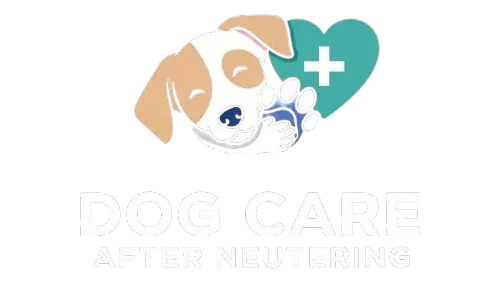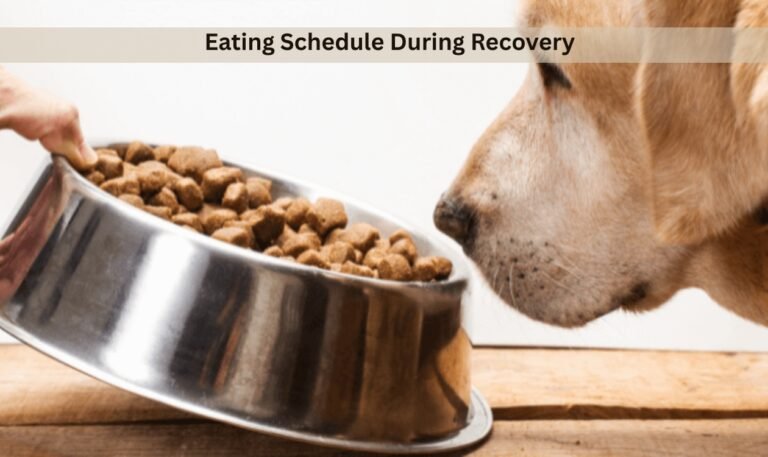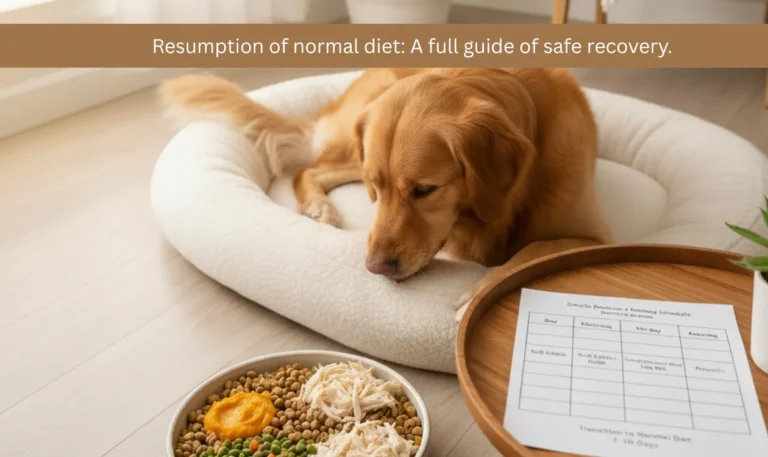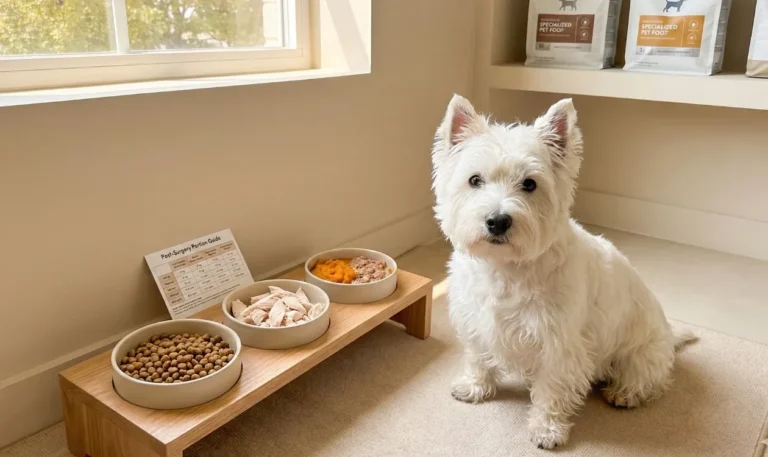When Can My Dog Eat After Being Neutered: Full Feeding Guide
Learn when can my dog eat after being neutered, what foods to give, and how to ensure safe, gentle feeding for a quick and healthy recovery.
Neutering means that after surgery; the body of your dog requires time to heal dog after the anesthesia. The digestive system decreases its activity temporarily and your dog will either feel groggy, nauseous or uninterested in food. There is nothing to worry about or panic in this regard.
It is important to know how your dog would act within the first 24 hours. They may be sleepy or confused, however, given proper care and soft feeding they will come to normal soon. It is always best to begin with smaller portions and see how your pet will respond and then you can give more.
When Can My Dog Eat After Being Neutered?
The majority of dogs may be initiated with a small and light snack 12-24 hours post-surgery. Premature feeding may result in vomiting or discomfort because of the residuing effects of anaesthesia. You should not food your dog until it is entirely awake and alert.
Start with light and easy-to-digest food such as boiled chicken or rice. You should not feed your dog large amounts of food because the stomach may be tender. If they are not ready to eat at first, there is no need to panic try again after a couple of hours or offer small portions by hand. These gentle feeding steps help prevent gastrointestinal distress discomfort or irritation within the digestive tract.
What to Feed Your Dog After Neutering
Once neutered, it is necessary to feed your dog lightly and with food that is healthy and helps in the healing process. Soothing and tasteless foods such as boiled chicken, rice or boring pumpkin are perfect. These are foods that are sources of energy and offer nutrients and do not strain the digestive system.
It is also possible to feed a vet-approved recovery diet that is designed to support healing after surgery. These foods are balanced, easily digestible, and high in protein to help repair tissues. The meals should always be served at room temperature and should not be seasoned or cooked with oil. Proper nutrition is an essential part of post-surgery dog care to ensure smooth and healthy recovery.
Why Appetite Changes After Surgery
It is normal to see dogs eat less after neutering because anaesthesia affects the stomach and appetite. They may also be reluctant to eat due to pain, medication, or discomfort at the surgical site. This usually improves within a day or two. In some cases, temporary appetite loss is linked to postoperative ileus a short-term slowdown of the digestive system after surgery
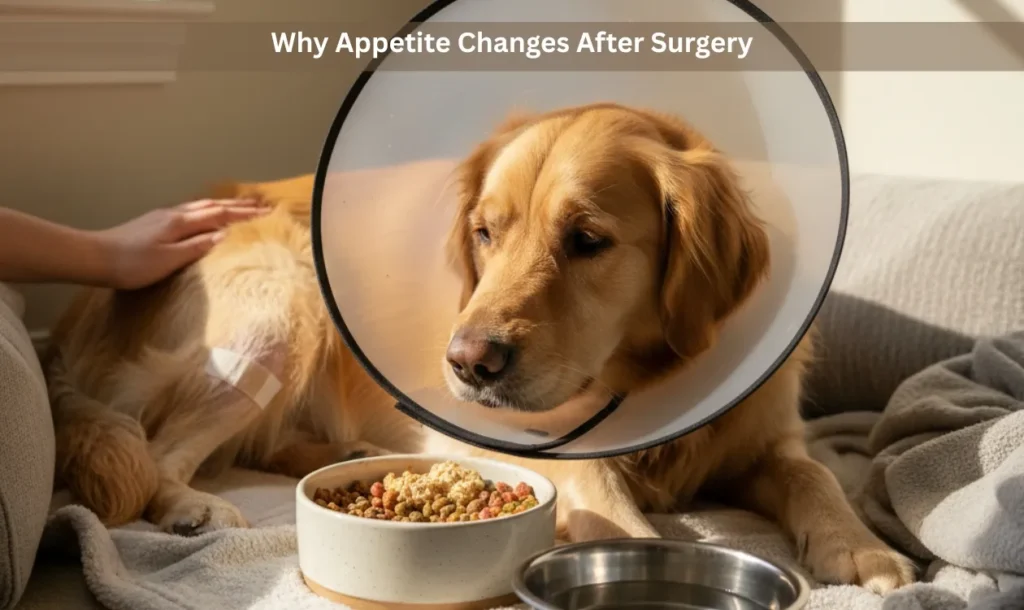
Other dogs might seem to be hungry but they refuse to take their usual food because of its change in taste or smell. The interim change to soft or aromatic foods will be helpful to tempt them to eat. The important elements in this recovery stage are mild encouragement and tolerance.
Hydration Is Just as Important as Food
Although your dog may not eat immediately, it is necessary to keep him/her hydrated. Water aids in the elimination of anaesthesia, aids in healing and prevents dehydration. Ensure that there is fresh and clean water.
In case your dog does not want to drink, add ice cubes, or combine water with the low sodium chicken broth to make it taste good. Wet food may also keep one hydrated. Existence of proper fluid intake leaves your pet in a comfortable position and it accelerates the recovery process.
Foods to Avoid After Neutering
Consumption of fatty, spicy or salty foods should be avoided following the surgery of your dog. These may irritate their stomach and retard recovery. Scraps of table, cookies, or food should never be administered in recovery.
Avoid crunchy food or bone-like food that can cause discomfort. In lieu of this, the only soft meals and light treats should be taken upon approval by your vet. Keep in mind that basic and balanced nutrition is most effective in the process of healing.
Managing Portion Size and Feeding Frequency
Dogs also need smaller portions after neutering since their metabolism slows down. Bloating or nausea may occur if they are fed large amounts. Begin with half of what they normally eat and gradually increase the amount as their appetite returns. Overfeeding too soon can sometimes cause gastric dilatation an abnormal expansion of the stomach due to excess food or gas
Separate their meals into two or three smaller meals during the day. This will assist in keeping the energy levels consistent without stuffing their stomach. Weight gain is another factor that is avoided with controlled feeding but neutered dogs tend to gain weight.
Encouraging Your Dog to Eat
When your dog appears to be uncooperative when it comes to eating, then you need to make mealtime a peaceful and stress-free experience. Eat at a peaceful place with no distractions. It is possible to make small bites more appetizing by hand-feeding or slightly warming the food.
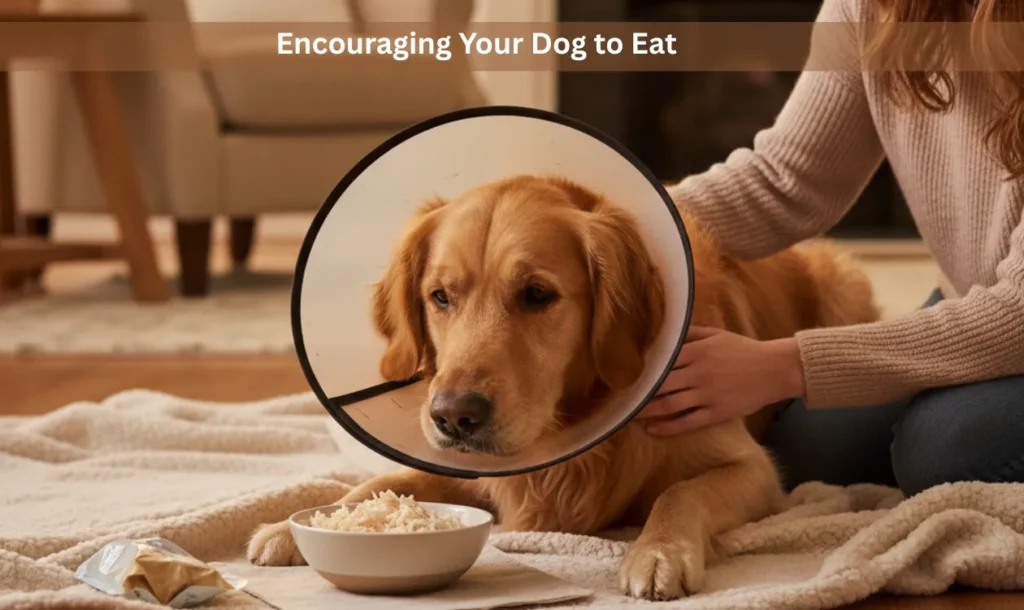
It is also possible to add a spoon of wet food or broth to add flavor and smell. You should not bother your dog to eat, only remind him or her in a nice way. They soon resume feeding on little portions and in a short time they have their appetite restored.
Monitoring Your Dog’s Recovery and Eating Habits
Monitor dog eating behavior within the initial days of surgery. It is a positive development when appetite comes back gradually. But in case your dog does not want to eat more than 48-72 hours, contact your vet.
Other behaviors to observe include the levels of energy, the quality of feces, and water consumption. A professional should check any vomiting, diarrhea, or pain around the incision to make sure that they heal properly.
Transitioning Back to Regular Diet
You can gradually restore your dog to its normal appetite and energy with his or her usual food once both return to normal. Over a few days, mix small amounts of their regular food with the recovery diet to avoid digestive upsets. This gradual transition helps prevent maldigestion a condition in which food is not broken down properly in the digestive system
Slowly make up the intake of normal food daily until the process is over. Keep portions under control and keep on providing fresh water. Gradual transition is a sure way of being comfortable and healthy in the long term, having undergone neutering.
FAQs: Can My Dog Eat After Being Neutered
Final Thoughts
It is important to know when your dog can eat after being neutered so as to have a smooth recovery. Light food can be safely consumed by most dogs in 12-24 hours and you can always consult your vet. Soothing feeding, hydration and time are all that matters.
Feed healthy food, keep track of the progress of your dog, and follow the calm environment. When properly taken care of and given food in the correct proportions, your pet dog will recover within days and you will have a playful animal again.
